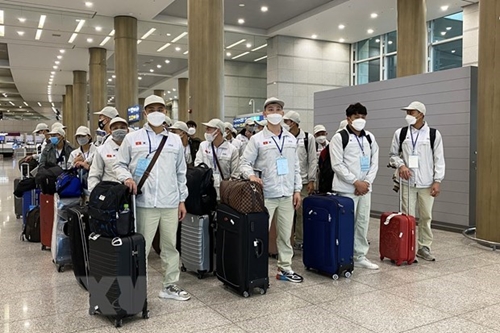An international conference was held in Hanoi on June 26 by the Vietnamese Ministry of Health and the ASEAN Secretariat with support from the IOM and the World Health organization (WHO). It attracted over 160 officials, experts, and scholars from ASEAN member countries who attended both in person and via videoconference.
    |
 |
|
Vietnamese guest workers arrive at Incheon Airport of the Republic of Korea. (Photo for illustration) |
According to reports delivered at the event, ASEAN has long been a source, a point of transit, or a destination of migrants and their families. It has the third biggest number of international migrants in Asia, after India and China.
Migration has caused complex burdens of health security on the region, including risks of communicable diseases, occupational injuries and accidents, mental health problems, non-communicable diseases, and maternal and child health. Such infectious diseases as HIV/AIDS, and tuberculosis (TB) remain challenges to ASEAN members. Some countries still record a high incidence of TB, HIV, and malaria cases. Notably, the Philippines, Myanmar, Indonesia, Thailand, and Vietnam are among the 30 countries with the highest rates of TB infections in the world.
ASEAN is currently uneven in terms of health services. Meanwhile, universal health coverage is a target hard to be reached even among citizens in their countries, not to mention migrants.
The IOM’s recent studies pointed out that barriers to transboundary migrants’ access to health services include the language barrier, discrimination, financial limitation, a shortage of transnational health insurance, and the lack of a mechanism for transnational patient transfer. Migrants were even more vulnerable during the COVID-19 pandemic, when they were unable to fully access necessary health services.
In her remarks, Deputy Minister of Health Nguyen Thi Lien Huong stressed the need to share experience, initiatives, and policy models to strengthen cooperation among ASEAN members, as well as between ASEAN and partners to improve migrants’ health.
IOM Chief of Mission in Vietnam Park Mi-hyung applauded the cooperation between the IOM and the Health Ministry.
She noted in a dynamic world with growing travel demand, regional cooperation and partnerships are important to improving migrants’ health, and that healthy migrants will help create healthy communities.
Park also highlighted the progress made by the IOM and ASEAN countries in promoting action plans on migrants’ health in accordance with the Global Compact for Migration.
Migrants’ health is one of the bloc’s priorities under the ASEAN Post-2015 Health Development Agenda, particularly ASEAN Health Cluster 3 on strengthening health systems and access to care.
Source: VNA